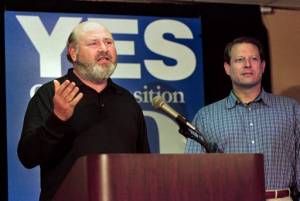Smoke more, government needs the cash

LIGHT UP: Cigarette-tax advocate Rob Reiner (here with Vice President Al Gore at a 1998 rally) pushes cigarette taxes to fund health programs for California kids.
By Steven Greenhut | Special to Watchdog.org
SACRAMENTO – One of the easiest mistakes for officials to make is to assume that people will continue to behave in the exact same way – regardless of any new tax rate or regulation that the government imposes. This “static” form of analysis leads to many unforeseen consequences and to results that usually defy the best-laid plans.
That economic maxim certainly is true with tobacco taxes, according to a new database analysis produced by Watchdog.org. Many states are ratcheting up their tobacco taxes, to comply with two contradictory goals: reducing smoking and funding various health-related programs. It’s a conundrum that often sparks debate, as agencies become addicted to the stream of nicotine dollars. Do they really have an incentive to see fewer smokers?
But the real conundrum involves the unforeseen behavior of smokers, who increasingly turn to the black market to buy cigarettes once the tax rates make their smoking habit too expensive. This database points to the tobacco tax rates in each state.
We see, for instance, that New York State imposes a $4.35 tax on every pack of cigarettes, which is the nation’s highest rate. Close behind is Rhode Island, which imposes a $3.46 a pack tax, then Connecticut at $3.40 and the state of Washington at $3.05. The lowest tax rates are in Missouri, with state tobacco taxes of only 17 cents a pack, Virginia at 30 cents and Louisiana at 36 cents.
Lo and behold, those states with the higher taxes have the higher rates of smuggling of cigarettes from other states and countries. Fifty-seven percent of cigarettes sold in New York come from elsewhere, whereas 48 percent of cigarettes sold in the state of Washington are black-market cigarettes. Virginia is at the opposite end of the spectrum, given that 21 percent of its cigarettes actually head toward other states. It is net exporter of black-market cigarettes — i.e., cigarettes that evade that particular state’s taxes.
About 4 percent of Louisiana cigarettes come illegally from other states. The correlation isn’t perfect. Some factors – mainly geography – come into play. Virginia no doubt is a big source of black-market cigarettes because it has a very low tax and is close to highly populated East Coast states with extremely high tax rates. Alaska and Hawaii have relatively small black-market cigarette markets most likely because of their isolation. It’s not easy smuggling anything to those places.
And we see changes over time. Black markets weren’t as much of a problem even in relatively high-tax states as long as those taxes were, non-scientifically speaking, within reason. As they soared to outrageous levels, so did the ingenuity of people who sought to buy and sell cigarettes under the radar of the taxing authorities. In some states, such as California, residents can legally buy cigarettes from Indian reservations, which have lower tax rates.
The bottom line: People adjust their behavior based on higher taxes. Maybe they stock up on a trip out of state, or maybe they buy cigarettes from smugglers. But they do try to shave the costs. These excessively high taxes undermine respect for the law, in addition to flying in the face of good economics.
And the authorities often try to make up for this loss of revenues by clamping down on black markets with heavier enforcement. The War on Drugs has been something less than a stellar success. In my view, we can live without a stepped up war on the legal product of tobacco — something that will be costly in taxes and will further erode our civil liberties.
As tax rates become punitive, smokers are less likely to have any moral objections to buying black-market cigarettes. ”Governments have increased taxes on cigarettes in recent years at least partly to discourage smoking, but more than half of U.S. smokers (58%) see these tax hikes as an act of unjust discrimination,” according to a Gallup Poll from July. If people feel discriminated against, they certainly will feel more justified in going around the rules.
“One reason various levels of government have increased these levies on cigarettes in recent years in that many public health advocates believe cigarette taxes can reduce smoking,” Gallup continued. “But the large majority of smokers, 71%, do not believe they personally smoke less because of the tax increases. … Independent research on the effectiveness of tax increases for reducing smoking rates is mixed. A study published by the National Bureau of Economic Research says, ‘It will take sizable tax increases, on the order of 100%, to decrease adult smoking by as much as 5%.’” That certainly contradicts what the anti-smoking forces have been saying.
For those who complain about uneven tax rates within the states and propose draconian measures to stamp out the differences, keep in mind that the same principle will always be at work. If New Yorkers can’t buy their cigarettes from Virginia, they’ll buy them from Mexico or Honduras.
Maybe it would be best if state government simply taxed and regulated cigarettes in a more reasonable manner – and paid attention to the data that the Watchdog researchers unveiled. But maybe it’s actually unrealistic to expect the government to change its behavior.
Steven Greenhut is the California columnist for U-T San Diego and a contributor to Watchdog.org.







